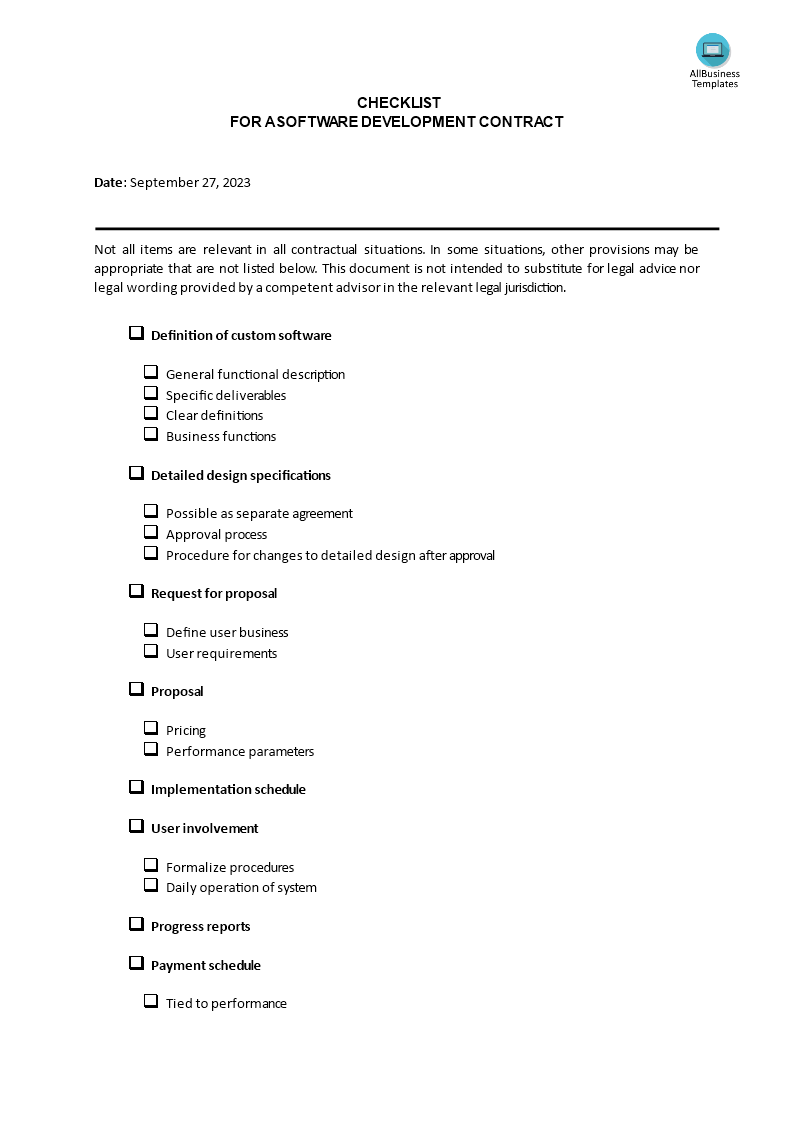Software Development Contract Checklist
Sponsored Link高级模板 保存,填空,打印,三步搞定!

下载 下载 Are you looking for a listing to go along with your software checklist? How should a software development contract be structured? this professional Software Development Contract Checklist template now!
只有今天: USD 1.99
点击购买

可用的免费文件格式:
微软的词 (.docx)- 本文档已通过专业认证
- 100%可定制
- 这是一个数字下载 (40.44 kB)
- 语: English
- 付款完成后,您将收到包含该文件的电子邮件。
Sponsored Link
Are you looking for a listing to go along with your software checklist? How should a software development contract be structured? The Software checklist template is a useful tool that helps to keep track of all software-related tasks. It includes sections for tasks related to the installation, configuration, and testing of software. Download this professional Software Development Contract Checklist template now!
A "Software Development Contract Checklist" is a comprehensive list of key items and considerations that should be addressed when drafting or reviewing a software development contract. This checklist is used to ensure that all critical aspects of the software development project are properly documented and agreed upon by both parties involved—the client (often referred to as the "customer" or "client") and the software development company or developer (often referred to as the "provider" or "vendor").
A well-structured software development contract helps clarify expectations, responsibilities, timelines, payment terms, and other important project details. Here is a checklist of common items to include in a software development contract:
- Parties Involved:
- Names and contact information of the client and the software development company.
- Legal entities and addresses of both parties.
- Project Description:
- Detailed description of the software development project, including its scope, objectives, and goals.
- Specific features, functionalities, and deliverables to be developed.
- Project Timeline:
- Start date and estimated completion date.
- Milestones or project phases with associated deadlines.
- Payment Terms:
- Payment schedule, including amounts, due dates, and payment methods.
- Conditions for payment, such as upfront deposits or progress payments.
- Scope Changes:
- Procedures for handling change requests, including additional work, modifications, or deviations from the original scope.
- How changes affect project timelines and costs.
- Intellectual Property:
- Ownership of intellectual property rights (e.g., copyrights, patents, and trademarks).
- Conditions for licensing or transferring intellectual property.
- Confidentiality and Non-Disclosure:
- Obligations related to the protection of confidential information.
- Non-disclosure agreements (NDAs) and confidentiality clauses.
- Warranties and Guarantees:
- Any warranties or guarantees related to the software's performance, quality, or functionality.
- Procedures for addressing defects or issues.
- Testing and Acceptance Criteria:
- Criteria for testing and accepting the software, including testing phases and acceptance criteria.
- How defects or non-conformance will be addressed.
- Termination and Cancellation:
- Conditions and procedures for terminating the contract.
- Termination penalties or fees, if applicable.
- Liability and Indemnification:
- Liability limits and responsibilities in case of damages, breaches, or legal disputes.
- Indemnification clauses protect both parties.
- Support and Maintenance:
- Terms and costs associated with post-launch support, updates, and maintenance.
- Response times for addressing issues.
- Dispute Resolution:
- Procedures for resolving disputes, including mediation, arbitration, or litigation clauses.
- Choice of law and jurisdiction.
- Insurance:
- Whether the software development company carries professional liability insurance and the coverage limits.
- Client Responsibilities:
- Client's obligations, such as providing necessary information, feedback, and access to resources.
- Cancellation and Refund Policy:
- Terms and conditions for canceling the project and any applicable refund policies.
- Signatures and Execution:
- Signature lines for both parties to indicate their acceptance and agreement to the terms.
- Appendices and Attachments:
- Any additional documents, specifications, or technical details relevant to the project.
A well-drafted software development contract helps mitigate risks, ensures clarity in expectations, and serves as a legally binding agreement between the client and the software development provider.
Download this Software Development Contract Checklist template now!
DISCLAIMER
Nothing on this site shall be considered legal advice and no attorney-client relationship is established.
发表评论。 如果您有任何问题或意见,请随时在下面发布
相关文件
Sponsored Link
